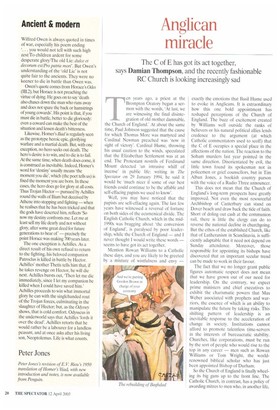Ancient St modern
Wilfred Owen is always quoted in times of war, especially his poem ending `. . . you would not tell with such high zest/To children ardent for some desperate glory/The old Lie: dulce et decorum estIPro patria more . But Owen's understanding of the 'old Lie' is not quite fair to the ancients. They were no keener to die in battle than Owen was.
Owen's quote comes from Horace's Odes (III.2), but Horace is not preaching the virtue of dying. He goes on to say 'death also chases down the man who runs away and does not spare the back or hamstrings of young cowards'. His point is that, if you must die in battle, better to die gloriously: even a coward can make the best of the situation and lessen death's bitterness.
Likewise, Homer's Iliad is regularly seen as the prototype heroic epic, glorifying warfare and a martial death. But, with one exception, no hero seeks out death. The hero's desire is to win, and to die is to fail. At the same time, when death does come, it is construed as inevitable. Indeed, Homer's word for 'destiny' usually means 'the moment you die', which (the poet tells us) is fixed the moment you are born. In these cases, the hero does go for glory at all costs. Thus Trojan Hector — pursued by Achilles round the walls of Ilium but deceived by Athene into stopping and fighting — when he realises that he has been tricked and that the gods have deserted him, reflects 'So now my destiny confronts me. Let me at least sell my life dearly and not without glory, after some great deed for future generations to hear of — precisely the point Horace was making 700 years later.
The one exception is Achilles. As a direct result of his own refusal to return to the fighting, his beloved companion Patroclus is killed in battle by Hector. Achilles' mother Thetis tells him that, if he takes revenge on Hector, he will die next. Achilles bursts out, 'Then let me die immediately, since I let my companion be killed when I could have saved him.' Achilles proceeds to win what immortal glory he can with the singlehanded rout of the Trojan forces, culminating in the slaughter of Hector; but, as the Odyssey shows, that is cold comfort. Odysseus in the underworld says that Achilles 'lords it over the dead'. Achilles retorts that he would rather be a labourer for a landless peasant, and at once asks after his living son, Neoptolemus. Life is what counts.
Peter Jones
Peter Jones's revision of E. V. Rieu's 1950 translation of Homer's Iliad, with new introduction and notes, is now available from Penguin.


































































 Previous page
Previous page